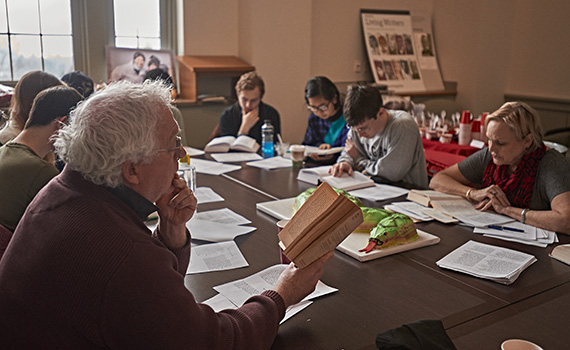
For more than eight hours, students and professors took turns reading from John Milton’s 10,000-line poem Paradise Lost. Photo by Zoe Zhong ’17
Devil’s food cupcakes with red, orange, and yellow “tongues-of-fire” frosting, chili said to be hotter than Hell, and Adam’s apple turnovers were just a few of the extra touches that brought the story of Satan, Adam, and Eve to life during the reading of Paradise Lost on March 1.
The “Miltonathon,” as such events have been dubbed worldwide, was a marathon of more than eight hours during which students and faculty took turns reading John Milton’s epic 10,000-line poem aloud.
Gathered in the Fager English Lounge, approximately 40 students and professors participated overall, and although there were only a few people left by the very end, at times there were more participants than available seats.
“I was moved by the turnout and the enthusiasm shown by many readers — some of them students I’d never met, several of whom stayed for hours,” said professor , who initiated the event. “Colleagues in fields rather remote from the mid-seventeenth century — Americanists, Medievalists, Victorianists, Modernists, and a Caribbeanist — all joined in.”
, English professor and director of the , added some extra flavor. For his contribution, Davies read several sections of the poem in a 19th-century Welsh translation.
The event served in part to honor the late professor of English emeritus , who had taught Milton at łÉČËÍ·Ěő for more than 40 years before his death in November 2013.
Klenck, who now teaches the class, also “hoped the event would make more members of the łÉČËÍ·Ěő community aware of the energy and accessibility of Milton’s verse.” Extra copies of Paradise Lost as well as pronunciation guides were provided for those who were new to the poem.
“Paradise Lost distills many aspects of the classical epic tradition, and it is, really, all by itself, a crash course, not only in language and literature, but also in history and geography,” Klenck explained. “The power of Milton’s use of blank verse (unrhymed iambic pentameter), with frequent heavy poetic stress on many extra syllables in almost every line, is most evident when read aloud.”
Miltonathons are common at campuses worldwide, from Princeton to the University of Saint Andrews.
Although the łÉČËÍ·Ěő group had to abandon their project after nine of the epic’s 12 books because of a blizzard, there is hope for next year; Klenck plans to turn the Miltonathon into an annual event.
